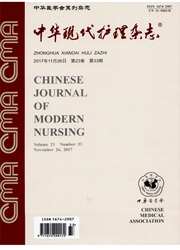

 中文摘要:
中文摘要:
目的探讨PCI术前干预对患者术时应激反应行为及结局的影响。方法选择2010年11月至2011年9月符合纳入标准的心血管患者106例,按随机数字法随机分为观察组和对照组,每组53例。对照组只进行常规术前检查和健康教育,观察组除了接受常规术前检查和术前健康教育外,还在术前20min接受由专业按摩人员给予的统一的、标准化的肩背部按摩护理。比较两组患者的收缩压、舒张压、脉率等生理应激反应指标,同时使用自评视觉量尺(VAS)和状态-特质焦虑量表(STAI)分析两组患者的焦虑、紧张程度和患者自述术中疼痛程度作为心理应激反应指标。结果干预前两组患者的生理应激反应指标和心理应激反应指标得分差异无统计学意义(P〉0.05);干预后观察组患者舒张压(77.82±12.23)mmHg,心率(70.55±4.88)次/min,进手术间心率(76.41±11.06)次/min,S-AI评分(35.71±9.55)分,T-AI评分(37.08±9.45)分,VAS得分(1.94±1.03)分,均低于对照组(88.13±11.06)mmHg,(74.75±5.98)次/min,(84.96±19.53)次/min,(44.84±7.41)分,(42.31±8.52)分,(3.87±1.55)分,两组比较差异均有统计学意义(t分别为4.552,3.962,2.773,5.499,2.992,7.550;P均〈0.05)。干预后观察组收缩压(128.74±14.64)mmHg,与对照组(124.45±17.32)mmHg比较差异无统计学意义(t=1.377,P〉0.05)。结论术前按摩护理干预支持可有效减轻心血管介入患者的焦虑、紧张和疼痛程度,在一定程度上改善患者术后结局,从而进一步支持按摩护理的效用,增强患者面对PCI术的信心和勇气。
 英文摘要:
英文摘要:
Objective To explorethe effect of nursing intervention for the patients awaiting the PCI surgery on the patients' stress response and outcomes. Methods One hundred and six patients who underwent the PCI surgery and met the inclusion criteria between November 2010 and September 2011 were recruited and randomly divided into control group and experiment group, with 53 patients in each group. The patients in the control group received routine preoperative examinations. In addition, the patients in the experiment group received a unified and standardized massage care provided by the therapists. Shoulders and back were the areas massaged. Pulse rate, systolic and diastolic blood pressure were compared as a physiological stress, the pain, anxiety and VAS scores were compared between two groups. Results Before the intervention, there was no significant differences in the scores of the physiological and psychological stress ( P 〉 0. 05 ). After the intervention, the scores of the diastolic blood pressure(77.82 ± 12.23)mm Hg,heart rate(70. 55 ±4.88)times/min, heart rate of going into surgery room ( 76. 41 ± 11.06 ) times/min, S-AI ( 35.71 ±9. 55 ), T-AI ( 37.08 ± 9.45 ), VAS(1.94 ±1.03) of the experiment group were lower than those of the control group(88. 13 ± 11.06) mmHg, (74.75 ±5.98 ), ( 84.96 ± 19.53 ) times/min, ( 44.84 ± 7.41 ), ( 42.31 ± 8.52 ), ( 3.87 ± 1.55 ), and the differences were statistically significant( P 〈 0.05 ). There were no significant differences in the systolic blood pressure between the experiment group( 128.74 ± 14.64) mm Hg and control group ( 124.45 ± 17.32) mm Hg ( t = 1. 377,P 〉 0.05 ). Conclusions The preoperative massage nursing intervention and support can effectively improve the anxiety, intense and pain of the patients during surgery and improve postoperative outcomes to some extent, promote the utility of massage care and increase patients' confidence and courage to face the PCI surgery.
 同期刊论文项目
同期刊论文项目
 同项目期刊论文
同项目期刊论文
 期刊信息
期刊信息
